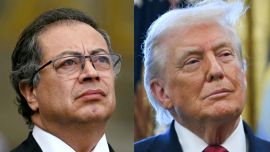The promise of Argentine president-elect, Javier Milei, to return the country to its splendour has raised hope in a society which longs for the “rich country” and “global power” of the early 20th century, although the “golden age” is not the same for everyone.
“Argentina was the richest country in the world in the early 20th century,” said Milei during his campaign, when he reviled the “decadence” happening now.
“With the reforms I propose, in 15 years we can reach levels such as those of Italy or France. If you give me 20 years, Germany, and in 35, the United States,” said Milei, a libertarian to be inaugurated as president of Argentina on Sunday, in a speech reminiscent of former US president Donald Trump.
Those words, according to historian Roy Hora, from the University of San Andrés, are not out of place.
“They strike a chord. We Argentines feel we should be playing in the first division.”
For a decade now, Argentina has not grown and is now in a severe economic crisis, with an annual inflation over 140 percent and over 40 percent of the population living in poverty.
“We were the main exporters of grains and meat. And we lost that,” said Franco Propato, a 23-year-old Milei follower, who still thinks that “if we set our minds to it, we can be a global power. We have a huge country with plenty of capacities”.
In the period from 1880 to 1929, when the Great Depression started, Argentina was a magnet, a promised land where millions of European immigrants arrived. The population quadrupled, from two million in 1869 to 7.9 million in 1914, according to the census.
Luna Block, a 20-year-old physical education teacher, smiles and says that “the Great Argentina was a long time ago, I wasn’t there”. Yet she thinks “it is feasible” for her country to become a global power, although she acknowledges that “it will take a long time.”
Hora stresses that in the late 19th century, the income per capita in Argentina was very high. “Not as high as the United States or England, but near European countries on the continent.”
Those riches came almost exclusively from agricultural exports and were hoarded by an upper class of landowners.
“Never before and never again were rich Argentines so rich”, the historian highlighted. “But the growth in the economy, which was very strong, also included the middle and working classes. That explains so much migration,” he said.
Those were the years when in Buenos Aires French-style palaces were erected and the spectacular Teatro Colón was built with luxury materials imported from Europe.
Yet according to historian Felipe Pigna, that time when Argentina was called the “world’s barn,” also signalled its doom.
“In actuality it is the best definition of the sentence by the world market and gladly accepted by our local oligarchies to their benefit to be suppliers of raw materials and buyers of manufactured products, many times with our own raw materials,” Pigna wrote.
It was a prelude to the crisis which followed when the rest of the world stopped importing due to economic depression or because it had become self-sufficient.
However, evoking that golden age has been recurrent in Argentine political discourse, which also added another paradise lost: the Peronist world of the 1940s and 1950s, when Juan Domingo Perón established the welfare state.
“It’s the paradise of equality, of social justice. Those who say we should not return to the liberal oligarchical period, condemned in general for its inequality, denounced as a time when profits were hoarded by the tip of society,” Hora pointed out.
“Those who value equality over freedom say the paradise has to be Peronist, those who value a more dynamic society with more opportunities usually favour the agro-export period,” he explained.
Between one paradise lost and another, Julieta Saravia, an 83-year-old educator, reflected: “A powerful country again? Please, no. This is a disorderly country, which if tidied up, can live a bit better.”
by Philippe Bernes-Lasserre, AFP



















Comments